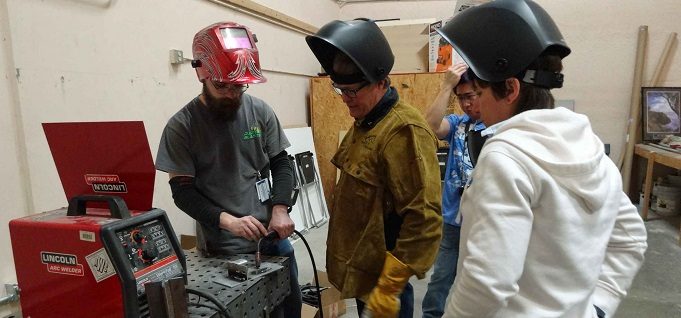California colleges embrace maker culture to close skills gap
By Karen Fraser-Middleton and Carol Pepper-Kittredge
March 16, 2017
The CCC Maker Initiative builds skills and encourages greater student and faculty engagement.
In the largest higher education system in the United States with 2.1 million students, 35 California community colleges are participating in the CCC Maker Initiative to close the state’s middle-skills gap. The goal is to develop a successful education makerspace model to prepare students with 21st-century skills and encourage STEM/STEAM careers to fuel job creation and strengthen regional economies.
The $17-million project is funded by the California Community College Chancellor’s Office, Workforce and Economic Development Division, under the Doing What MATTERs for Jobs and the Economy framework. Sierra College is the fiscal agent. Colleges are being guided by an advisory committee made up of national leaders in education and the maker movement.
The mission is to build a community of college makerspaces that welcome non-traditional students, support faculty in embedding “making” into instruction and offering adaptive curriculum, and partner with businesses to produce innovation-ready graduates inspired to contribute to the creative economy.
By embracing the maker culture, the participating colleges are creating a community of practice across the state to share experiences and resources, learn from each other and experiment with more accessible instructional delivery methods. They are discovering as much from successes as failures as they devise unique makerspaces that fit their region.
They face challenges such as lack of facilities on campus for a makerspace and are innovating by considering mobile maker carts, renovating existing labs, offering events in libraries and partnering with off-campus makerspace providers.
Engaging faculty in the maker movement
Breaking new ground, faculty is collaborating across departments to develop curriculum, write makerspace plans, acquire equipment and apply for funds. At Allan Hancock College, industrial technology, learning resources, fine arts, life and physical sciences and the Pacific Conservatory for the Performing Arts are preparing a joint Perkins/CTEA funding application. Folsom Lake College has a designated faculty member to drive making across the curriculum. Cabrillo College has launched four sequenced courses in digital arts fabrication.
The CCC Maker Initiative provided $40,000 in seed grants in January 2017 to the 35 colleges to develop implementation plans. Support resources include webinars, regional meetups, training and coaching from the technical assistance provider, Pasadena City College (they’ve had an on-campus Fab Lab for more than five years). Embracing the maker culture, the colleges are encouraged to learn from each other.
Colleges are collecting data on their institutions, using online Kumu to prepare maps of their surrounding ecosystems, developing logic models and designing their makerspaces. The resulting makerspace implementation plan will be a part of the application for two more years of funding up to $350,000 per year. The CCC Maker colleges have been invited to participate in Maker Faire in San Mateo in May 2017 to share what they’ve learned with colleges, advisors and the public.
By modeling innovation, collaboration and inclusiveness, the colleges anticipate that students will discover career paths, develop entrepreneurial skills, enhance their portfolios, cultivate soft skills and gain real-world connections that prepare them for employment. The CCC Maker plans should reflect a rich diversity in approach to incorporating making into education, providing internships and building maker communities locally and throughout California.
Continue the discussion at LinkedIn.




